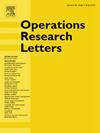最优决策树的一个简单逼近算法
IF 0.9
4区 管理学
Q4 OPERATIONS RESEARCH & MANAGEMENT SCIENCE
引用次数: 0
摘要
在最优决策树(ODT)问题中,我们给定m个假设,其中一个未知的“真”假设根据某种概率分布被绘制出来。任务是通过执行代价高昂的查询来识别真实的假设,每个查询都有已知的响应。ODT是np困难的,难以在ln (m)的因子内近似,而现有的O(ln (m))近似算法由于前导常数较大而很复杂。我们提供了一个简单的ODT算法和分析,证明了近似比为8ln ln m。本文章由计算机程序翻译,如有差异,请以英文原文为准。
A simple approximation algorithm for optimal decision tree
In the optimal decision tree (ODT) problem, we are given m hypotheses, out of which an unknown “true” hypothesis is drawn according to some probability distribution. The task is to identify the true hypothesis by performing costly queries, each with known responses. ODT is NP-hard to approximate within a factor of , and existing approximation algorithms are complex with large leading constants. We provide a simple algorithm and analysis for ODT, proving an approximation ratio of .
求助全文
通过发布文献求助,成功后即可免费获取论文全文。
去求助
来源期刊

Operations Research Letters
管理科学-运筹学与管理科学
CiteScore
2.10
自引率
9.10%
发文量
111
审稿时长
83 days
期刊介绍:
Operations Research Letters is committed to the rapid review and fast publication of short articles on all aspects of operations research and analytics. Apart from a limitation to eight journal pages, quality, originality, relevance and clarity are the only criteria for selecting the papers to be published. ORL covers the broad field of optimization, stochastic models and game theory. Specific areas of interest include networks, routing, location, queueing, scheduling, inventory, reliability, and financial engineering. We wish to explore interfaces with other fields such as life sciences and health care, artificial intelligence and machine learning, energy distribution, and computational social sciences and humanities. Our traditional strength is in methodology, including theory, modelling, algorithms and computational studies. We also welcome novel applications and concise literature reviews.
 求助内容:
求助内容: 应助结果提醒方式:
应助结果提醒方式:


